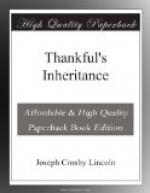Mr. Hammond ate three sandwiches and two plates of ice cream, also he smoked two cigars. He did not really feel the need of the second cream or the second cigar, but, as they were furnished without cost to him, he took them as a matter of principle. Hence the indigestion.
The “grouch” was due partially to the unwonted dissipation and its consequences and partly to the fact that his winter “flannels” had not been returned by Mrs. Melinda Pease, to whom they had been consigned for mending and overhauling.
It was the tenth of November and for a period of twenty-four years, ever since his recovery from a severe attack of rheumatic fever, Caleb had made it a point to lay aside his summer underwear on the morning of November tenth and don a heavy suit. Weather, cold or warm, was not supposed to have any bearing on this change. The ninth might be as frigid as a Greenland twilight and the tenth as balmy as a Florida noon—no matter; on the ninth Mr. Hammond wore light underwear and shivered; on the tenth he wore his “flannels” and perspired. It was another of his principles, and Caleb had a deserved reputation for adhering to principle and being “sot” in his ways.
So, when, on this particular tenth of November, this Sabbath morning, he rose, conscious of the sandwiches and “tonic,” and found no suit of flannels ready for him to don, his grouch began to develop. He opened his chamber door a crack and shouted through the crack.
“Mrs. Barnes,” he called. “Hi—i, Mrs. Barnes!”
Thankful, still busy in the kitchen, where she had been joined by Imogene, sent the latter to find out what was the matter. Imogene returned, grinning.
“He wants his flannels,” she announced. “Wants to know where them winter flannels Mrs. Pease sent home yesterday are. Why, ain’t they in his room, he says.”
Thankful sniffed. Her experience with Miss Timpson, and the worry caused by the latter’s leaving, had had their effect upon her patience.
“Mercy sakes!” she exclaimed. “Is that all? I thought the house was afire. I don’t know where his flannels are. Why should I? Where’d Melindy put ’em when she brought ’em here?”
Imogene chuckled. “I don’t think she brought ’em at all,” she replied. “She wa’n’t here yesterday. She—why, yes, seems to me Kenelm said he heard she was sick abed with a cold.”
Thankful nodded. “So she is,” she said. “Probably the poor thing ain’t had time to finish mendin’ ’em. It’s a good deal of a job, I guess. She told me once that that Hammond man wore his inside clothes till they wa’n’t anything but mendin’, just hung together with patches, as you might say. His suits and overcoats are all right enough ’most always, but he can’t seem to bear to spend money for anything underneath. Perhaps he figgers that patches are good as anything else, long’s they don’t show. Imogene, go tell him Melindy didn’t fetch ’em.”




